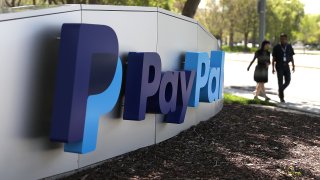
- PayPal is exploring ways to let users trade individual stocks, according to two sources familiar with the plan.
- As part of the expansion, according to one of the sources, the payment giant hired a brokerage industry veteran to lead "Invest at PayPal" — a previously unreported division of the payments giant.
- The move comes amid a retail trading boom that brought millions of new investors into the stock market, along with more regulatory scrutiny for some brokerage firms.
PayPal is exploring a possible stock-trading platform.
After rolling out the ability to trade cryptocurrencies last year, the payments giant has been exploring ways to let users trade individual stocks, according to two sources familiar with the plans.
The San Jose, California-based company recently hired brokerage industry veteran Rich Hagen as part of the move, according to one of the sources. After leaving Ally Invest, Hagen is now the CEO of a previously unreported division of PayPal called Invest at PayPal, according to his LinkedIn page. Hagen was the co-founder of online brokerage TradeKing, which was bought by Ally Invest.
Get Southern California news, weather forecasts and entertainment stories to your inbox. Sign up for NBC LA newsletters.
His current job description outlines PayPal's efforts to "explore opportunities" in the consumer investment business. When reached for comment, PayPal pointed CNBC to CEO Dan Schulman's comments at the company's investor day in February, when he spoke about the long-term vision for the company and how it may include many more financial services, including "investment capabilities."
PayPal's move comes amid a retail trading renaissance. More than 10 million new individual investors have entered the market in the first half of this year, roughly matching last year's record level, according to estimates from JMP Securities. A combination of stay-at-home orders during the pandemic, government stimulus checks and viral events like the rise of GameStop in January have spurred on new interest in the stock market.
Money Report
Trading has become a booming business for the companies that offer it. PayPal rival Square offers stock and cryptocurrency trading through the Square Cash App, and its CFO has said the app drives engagement and revenue per user. Robinhood, which became a publicly traded company this summer, has seen explosive growth with more than 22.5 million customers and doubled revenue in the most recent quarter from a year ago.
In order to offer stock trading to customers, it's possible PayPal will partner with or buy an existing broker-dealer. According to one source, PayPal has held already discussions with potential industry partners.
Still, one source familiar with the idea said it was unlikely that the trading service would roll out this year. The sources spoke on condition of anonymity because PayPal's plan was not public, and they were not authorized to share information about possible partnerships.
Shares of PayPal jumped more than 3% following the CNBC report, while Robinhood shares lost more than 3%.
If PayPal did look to get full approval as a brokerage firm alone, it would need to complete a new membership process through the industry's main regulator, FINRA. That process could take more than eight months. PayPal has more than 400 million accounts worldwide.
A PayPal stock-trading launch would come at competitive time for the fintech industry. Square, PayPal, Robinhood and SoFi offer a list of overlapping products and describe the same mission of being a one-stop-shop for finance. Cryptocurrency and stock trading are seen as ways to keep consumers engaged on these payment platforms.
While helpful for user growth and revenue, the retail trading boom has also invited more regulatory scrutiny.
The Securities and Exchange Commission said last week it is stepping up its inquiry into "gamification" and how brokerages use technology to interact with their customers. The agency mentioned behavioral prompts used by online brokerages and investment advisors that may encourage investors to trade more stocks and other securities and take on more risks.






